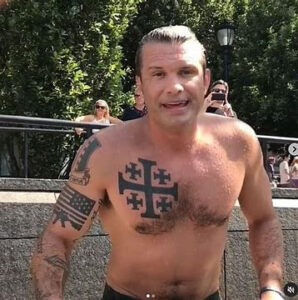BY CLINT COMBS
Diversity hires have been criticized for harming intelligence agencies, with the White House arguing that such initiatives have weakened national security. Pete Hegseth, a former Fox News host, now leads the Pentagon’s campaign against Diversity, Equity, and Inclusion (DEI) initiatives. His rise reflects a broader reshaping of national security leadership along partisan lines. One of the administration’s “five-star recruits,” Congressman Mike Waltz, demonstrated his qualifications by mistakenly adding The Atlantic’s editor Jeffrey Goldberg’s number to an encrypted Signal group chat, thinking it belonged to Trump spokesperson Brian Hughes. The result? A momentary national security blunder that highlighted how cavalier some in power are with classified information.

Pete Hegseth
This carelessness contrasts sharply with the treatment of whistleblowers. Terry Albury, a Black former FBI analyst, saw systemic racism firsthand in 2012. Assigned to the Minneapolis Joint Terrorism Task Force, Albury overheard a secretary discussing the city’s Somali population at Riverside Plaza, known as “the Somali towers.” She said, “I think we should blow up the Somali towers,” adding, “These people are dirty, smelly, disgusting, worthless pieces of shit.”
Albury confronted her, but his efforts to expose this prejudice came at great personal risk. Using an encrypted email, he contacted a journalist, and the documents he shared became public as “The FBI’s Secret Rules”, revealing how the Bureau handles informants, surveillance, and profiling. Ironically, before his prosecution, former FBI Director James Comey had honored Albury for uncovering sleeper cells linked to Al-Nusra.
Similarly, Daniel Hale, a former Air Force airman turned contractor at the National Geospatial-Intelligence Agency, exposed a 166-page document detailing how the government places individuals on the terrorist watch list. A federal judge later ruled the system unconstitutional. Hale was prosecuted under the Espionage Act for revealing this information.
Jaylani Hussein, Executive Director of CAIR-Minnesota, explained that systemic bias persists, referencing the Minneapolis Police Department’s forced reform through a DOJ consent decree, while Somali communities remain targets despite formal oversight elsewhere.

Daniel Hale
Despite public blunders, figures like Hegseth, Walz, Director of National Intelligence Tulsi Gabbard — who pledged to go after whistleblowers — and CIA Director John Ratcliffe — who supports an aggressive cyber posture — are unlikely to face consequences. Their missteps, intentional or not, seem protected by political alignment.
This is a stark contrast to the treatment of whistleblowers like Albury and Hale, who exposed government overreach and abuse. Both were prosecuted under the Espionage Act — a 100-year-old law now being wielded as a political weapon.
Jeffrey Sterling, a former CIA officer, faced racial discrimination during his career, including being told he was “too big and too Black” to represent the agency abroad. He filed a racial discrimination lawsuit against the CIA, which was moved from New York to the Eastern District of Virginia, near the CIA’s headquarters. Despite no direct evidence of leaking classified information, Sterling was prosecuted under the Espionage Act. His trial highlighted racial disparities, with most CIA officers testifying as white.
Sterling also criticized the reckless decision-making in U.S. military actions, particularly the unauthorized bombing of Yemen by the Trump administration. He described it as a show of power, not strategy, and criticized intelligence officials for reportedly using a “free app for classified discussion.” He questioned whether a reporter’s presence in the Signal group was intentional, asking, “Was that on purpose? Were they wanting to use him as a plant?”
Trump’s unauthorized strike on Yemen, carried out without congressional approval, was about flexing power. In this administration, underqualified white men can fail upward in national security, while people of color who speak out are silenced, surveilled, or prosecuted.
Daniel Hale exposed the civilian toll and lack of transparency in the U.S. drone program, sparking public debate without endangering anyone. In contrast, Pete Hegseth carelessly mishandled sensitive communication by allowing a journalist into a secure Signal chat, risking the exposure of real-time national security discussions. Hale acted out of moral conviction; Hegseth acted out of incompetence.






















